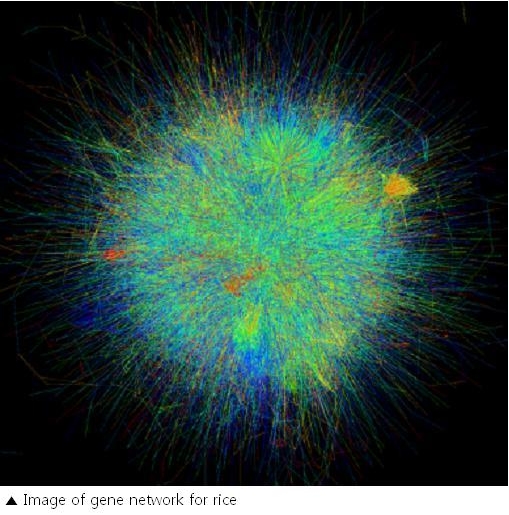Gene social network for rice, one of world's four major grains, identified
PR KISTI 2012-02-28 View. 8,450
Korean researchers have led a study to identify a gene social network for rice, one of the world's four major grains.? This gene social network study was published in the Proceedings of the National Academy of Sciences on October 31.
The study was led by Prof. Lee In-suk at Yonsei University, with participation of Prof. Pamela Ronald from the University of California, Prof. Edward Marcotte of the University of Texas in the U.S., and Prof. Seo Young-su at Pusan National University in Korea.
The study was conducted with the support of the "Veteran Researcher Assistance (Leap Research)" program, which is managed by the Ministry of Education, Science and Technology (Minister Lee Ju-ho) and the National Research Foundation of Korea (Chairman Oh Se-jung).
The study was published online first in the October 31 issue of the Proceedings of the National Academy of Sciences, a prestigious international science journal. The study was titled 'Genetic dissection of the biotic stress response using a genome-scale gene network for rice.'
Prof. Lee's team constructed a gene social network that interlinks 20,000 genes, or half of all rice genes, for the first time in a commercial crop and discovered new genes (rox 1, 2 and 3), which are important to its resistance to diseases and insects by using the network.
Prof. Lee has also constructed gene social networks for yeast, a micro organism (Science 2004), eelworm (Nature Genetics 2008), Arabidopsis thaliana, a plant model (Nature Biotechnology 2010), and humans (Genome Research 2011). He has thus demonstrated that scientists can effectively predict and discover new genes that will be important to disease resistance in humans and to the resistance of plants to the environment.?
Notably, Prof. Lee this time constructed a gene network for rice, a commercial crop, and demonstrated that a gene research technique based on networks can be an important solution to addressing the food, energy, and environmental problems of the world going forwards.
The research team also successfully discovered three rox genes, which play a critical role in improving a plant's resistance to diseases and insects, by conducting tests of only five candidate genes using the network. This is a method that thus allows scientists to discover the functions of new genes in a greatly more efficient manner (12-fold efficiency increase), when compared with the conventional genetic research method based on a random search.
Prof. Lee said, "The study is a success wherein we completed a gene social network for rice and discovered genes that are resistant to certain harmful environments, including drought, diseases and insects, by using the network. We also demonstrated the possibility for the development of transgenic crops." He added, "Such a gene network is expected to bring about revolutionary advances in research on agriculture and bio energy in the future."

 Delete Article!
Delete Article!